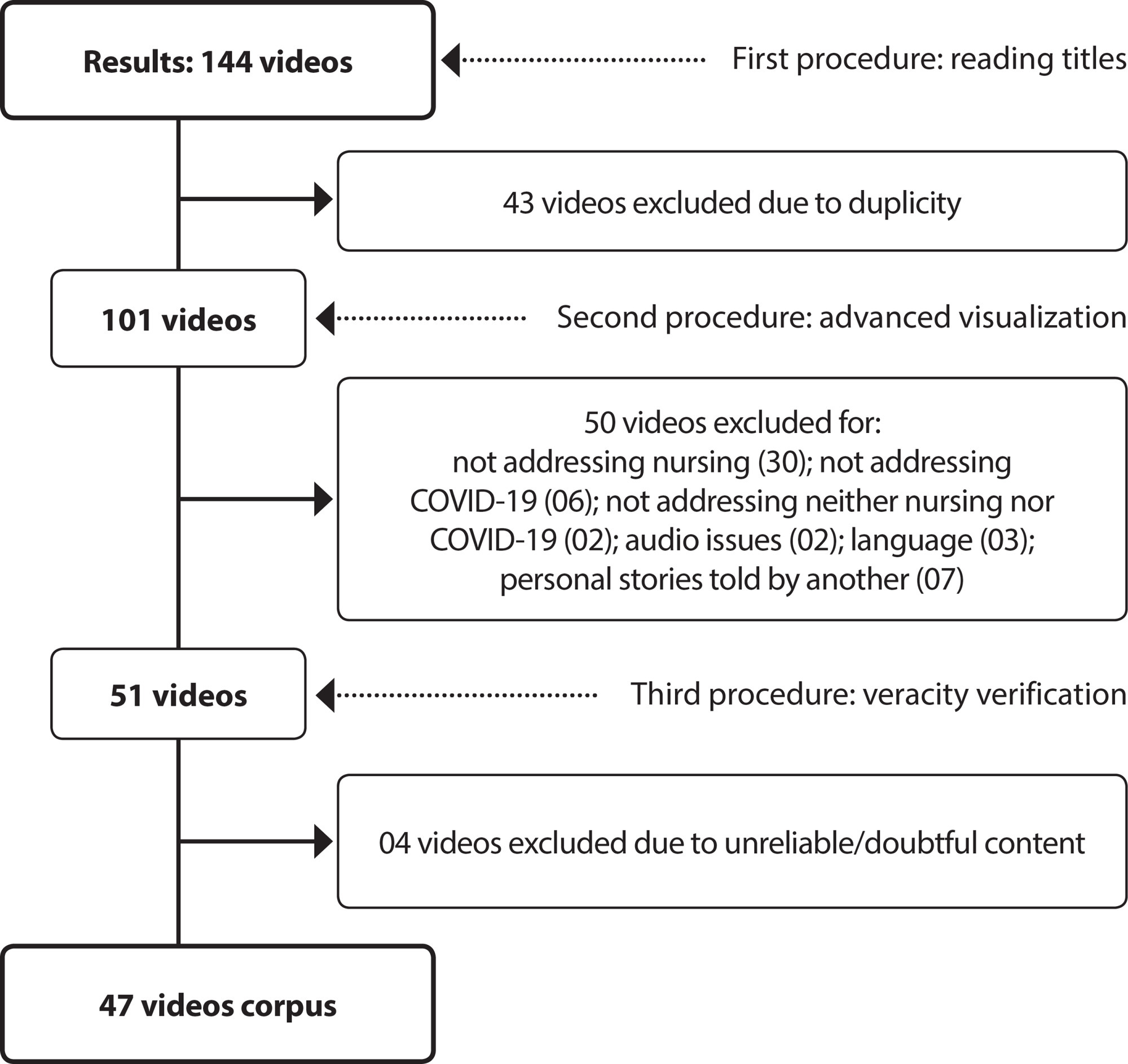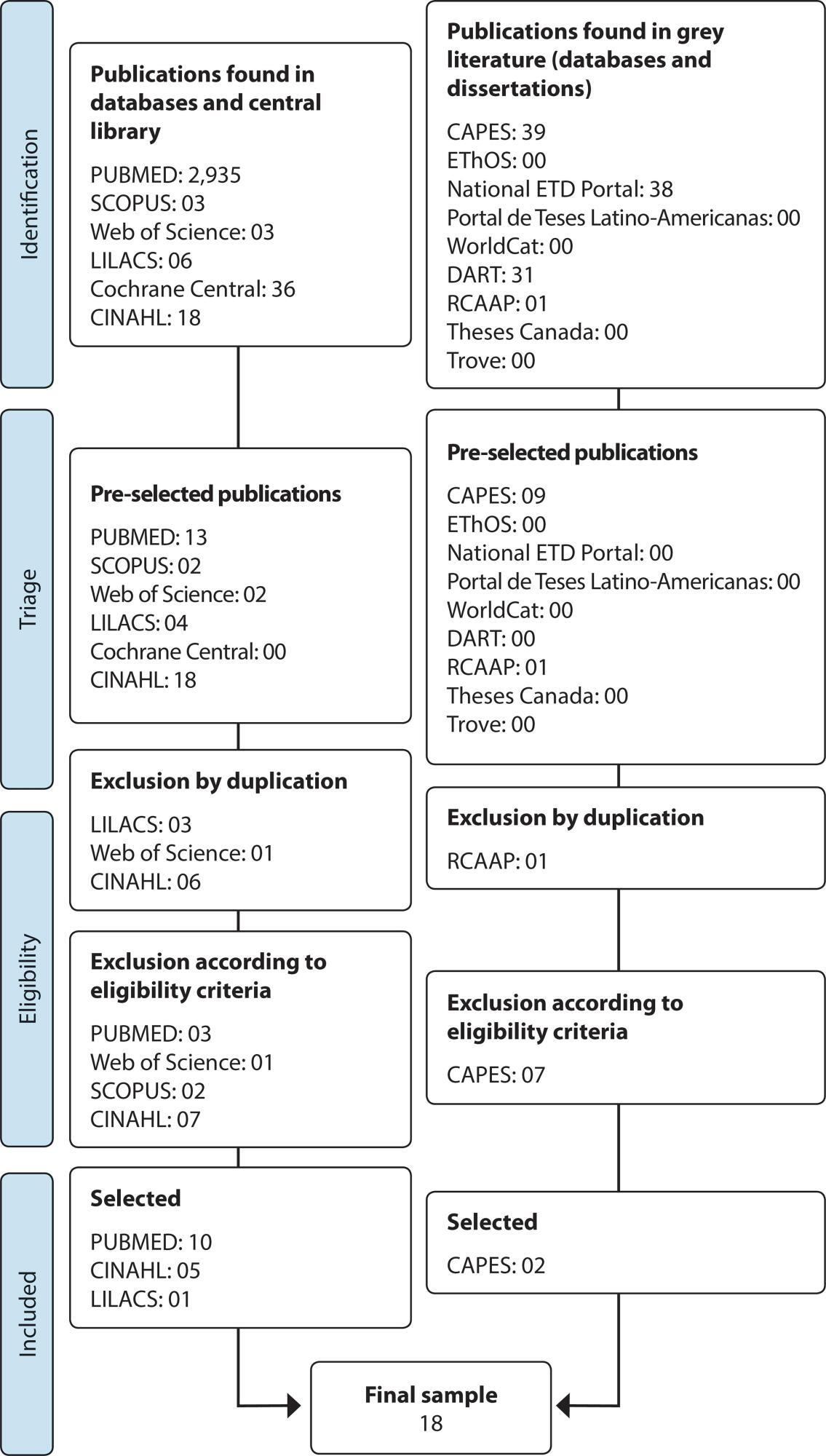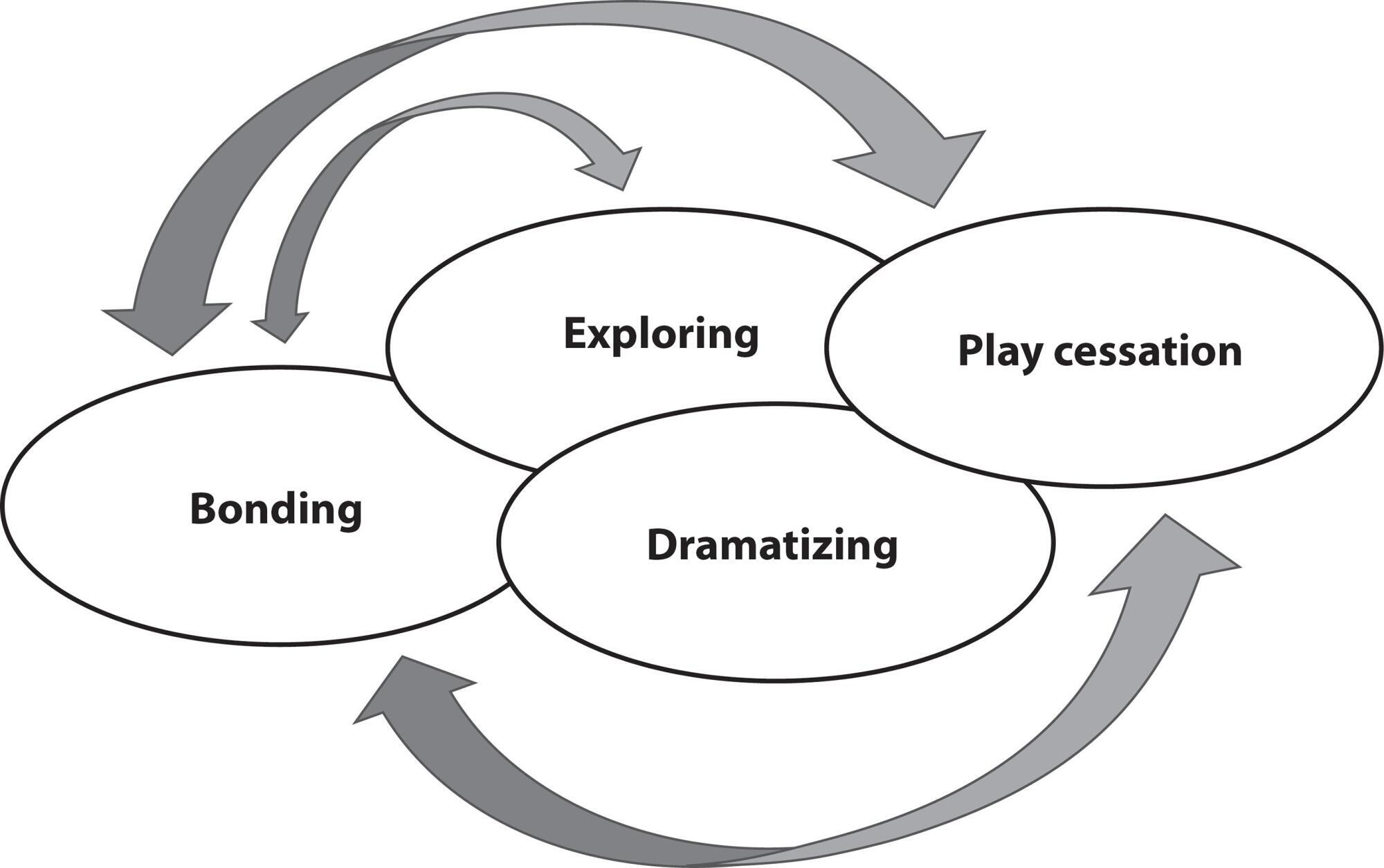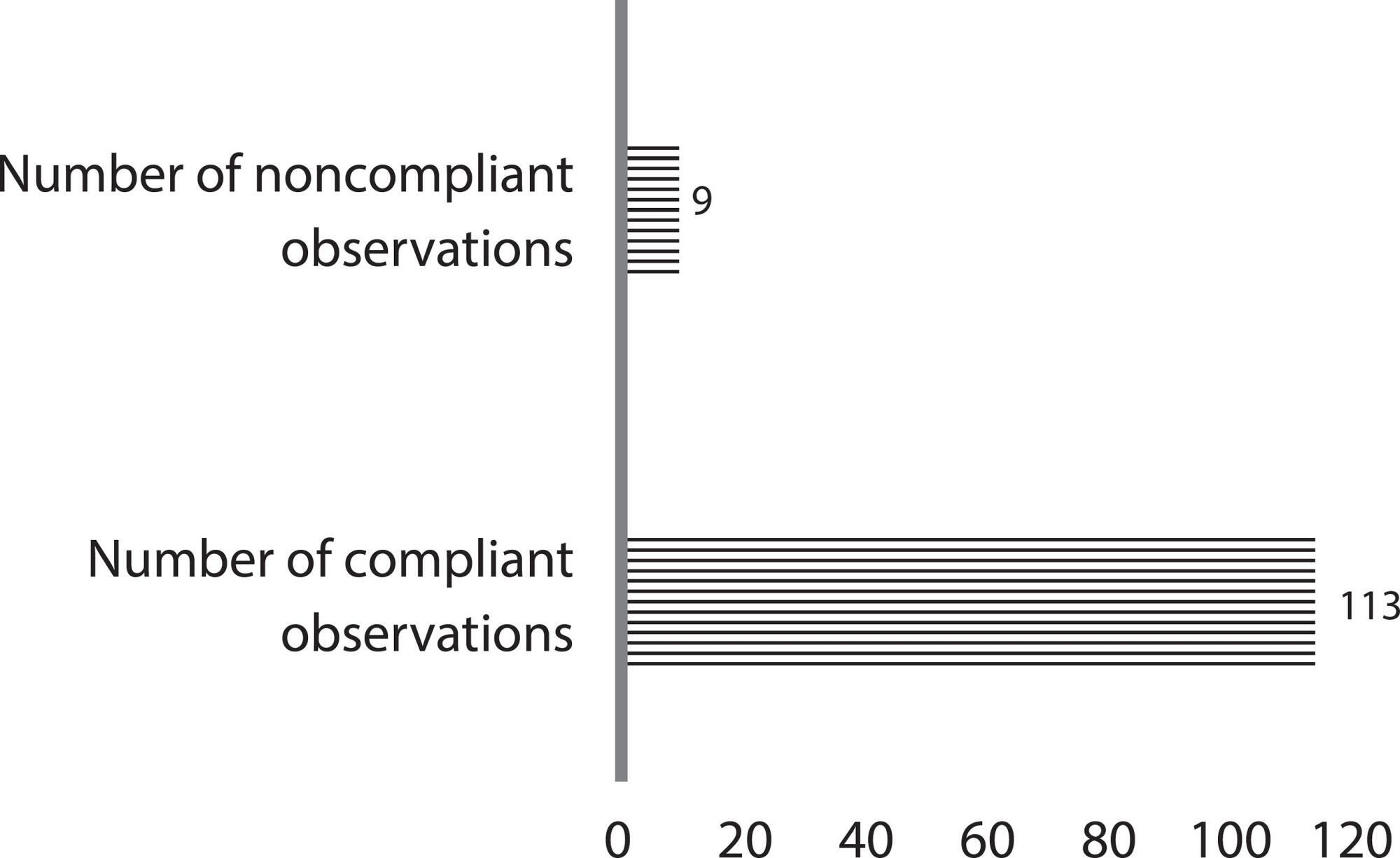-
RESEARCH
Perception of nursing undergraduate students on self-aging
Revista Brasileira de Enfermagem. 2015;68(2):278-283
01-01-2015
Abstract
RESEARCHPerception of nursing undergraduate students on self-aging
Revista Brasileira de Enfermagem. 2015;68(2):278-283
01-01-2015DOI 10.1590/0034-7167.2015680213i
Views0See moreABSTRACT
Objective:
to analyze the perceptions of nursing undergraduate students on their self-aging process.
Method:
qualitative study carried out between August and September, 2011 with 18 nursing undergraduate students of a public university in Salvador, Bahia. The interviews were analyzed by means of the Content Analysis method.
Results:
the following thematic concept was apprehended: Perceptions of nursing undergraduates on their self-aging, which generated two subcategories: A) The “don’t think about it” process; B) The context infl uencing the process.
Conclusion:
undergraduates reveal that the aging process is an intrinsic factor to human development. Family ties, spirituality and physical activity would be key mechanisms toward active aging. However, students also reported that their accelerated and stressed social lifestyles led to inadequate habits, such as the consumption of fast food and alcohol, which become negative infl uences in their aging process.
-
RESEARCH
Non-conventional technologies for data collection in Brazilian dissertations and theses
Revista Brasileira de Enfermagem. 2015;68(2):269-277
01-01-2015
Abstract
RESEARCHNon-conventional technologies for data collection in Brazilian dissertations and theses
Revista Brasileira de Enfermagem. 2015;68(2):269-277
01-01-2015DOI 10.1590/0034-7167.2015680212i
Views0See moreABSTRACT
Objective:
to characterize non-conventional technologies used for data collection of dissertations and theses available in the Catalog of Theses and Dissertations (CEPEn) of the Brazilian Nursing Association (ABEn).
Method:
this is a documentary research, whose data were collected in the catalogs of theses and dissertations available at the ABEn website, from Volumes XIX to XXI. The indicators collected were: academic level; educational institution; year; qualification of the author; setting; non-conventional technology used; type of technology; association with conventional techniques; methodological design; benefi ts and methodological limitations.
Results:
from a total of 6346 studies, only 121 (1.91%) used non-conventional technologies for data collection, representing the fi nal sample of the study.
Conclusion:
it is concluded that Brazilian Nursing researches still need methodological innovations for data collection.

-
RESEARCH
Content analysis of a technology to the nursing diagnostic reasoning
Revista Brasileira de Enfermagem. 2015;68(2):261-268
01-01-2015
Abstract
RESEARCHContent analysis of a technology to the nursing diagnostic reasoning
Revista Brasileira de Enfermagem. 2015;68(2):261-268
01-01-2015DOI 10.1590/0034-7167.2015680211i
Views0See moreABSTRACT
Objective:
to undergo a content analysis of a metacognitive strategy of indirect assessment in the pre-encounter with the client.
Method:
methodological study. Agreement and inter-rater reliability index for the criteria: relevance, adequacy, clarity, conciseness and accuracy of a technology to the nursing diagnosis reasoning for novices through an electronic form. The sample consisted of 13 raters. Data were analyzed using descriptive statistics.
Results:
high agreement and inter-rater reliability for 85 items related to data collection stage and the strategy description. Only fi ve items did not reach the validation criteria and must be rewritten.
Conclusion:
indirect assessment of the pre-encounter is relevant to the diagnostic reasoning process, being possible to develop competencies and diagnostic skills in the novice through strategies, proposals on innovative technology in the form of a diagram.
-
RESEARCH
Manual for monitoring the quality of nursing home care records
Revista Brasileira de Enfermagem. 2015;68(2):253-260
01-01-2015
Abstract
RESEARCHManual for monitoring the quality of nursing home care records
Revista Brasileira de Enfermagem. 2015;68(2):253-260
01-01-2015DOI 10.1590/0034-7167.2015680210i
Views0See moreABSTRACT
Objective:
to build and validate an instrument aimed at monitoring the quality of nursing records in the Home Care Program (HCP) of a university hospital.
Method:
methodological study involving the elaboration of a manual, whose content was later submitted to six experts for validation, reaching a ≥ 80% consensus. The data collection process was carried out in 2012 by means of a questionnaire comprised of the following issues: nursing evolution, nursing diagnosis, and nursing prescription, and standards for the nursing team recommended by the Regional Nursing Council of São Paulo and by the assessed institution. Manual items were judged according to the following variables: relevance, pertinence, clarity and simplicity.
Results:
of the 39 propositions, 100% achieved ≥ 80% agreement in the relevance, pertinence and clarity variables; 92.3% in the simplicity variable. Sleep/rest, Mobility and Check-out variables did not reach a favorable minimum consensus in the prescribed activities and were improved following suggestions from the experts.
Conclusion:
we believe that the instrument will enable the improvement of the HCP’s work process.
-
RESEARCH
Vulnerability of families of elderly citizens cared for by the Family Health Strategy
Revista Brasileira de Enfermagem. 2015;68(2):244-252
01-01-2015
Abstract
RESEARCHVulnerability of families of elderly citizens cared for by the Family Health Strategy
Revista Brasileira de Enfermagem. 2015;68(2):244-252
01-01-2015DOI 10.1590/0034-7167.2015680209i
Views0See moreABSTRACT
Objective:
the present descriptive, exploratory, cross-sectional study aimed to identify the vulnerability of families of elderly citizens cared for by the Family Health Strategy (FHS).
Method:
the research employed home interviews and was developed with a sample of 500 families of aged people cared for by 32 FHS teams in the city of Dourados, MS, Brazil. The Family Development Index (FDI) was adapted in order to classify the families according to their degree of vulnerability.
Results:
the results revealed the presence of multigenerational families with low educational levels among individuals over the age of 20 and high illiteracy rates among elderly citizens. There were 403 families whose vulnerability was acceptable, 95 in severe vulnerability, and two families in a condition of very severe vulnerability. The most critical dimensions of the FDI were the access to knowledge and to work.
Conclusion:
the study identifi ed that there is still a need for further investments that can assist these aged people and their families in the Primary Health Care.
-
RESEARCH
The work in prison: reflections on the health of prison officers
Revista Brasileira de Enfermagem. 2015;68(2):235-243
01-01-2015
Abstract
RESEARCHThe work in prison: reflections on the health of prison officers
Revista Brasileira de Enfermagem. 2015;68(2):235-243
01-01-2015DOI 10.1590/0034-7167.2015680208i
Views0See moreABSTRACT
Objective:
to understand the working conditions of prison offi cers and the repercutions of labor activity on their health.
Method:
qualitative and descriptive research. Data were collected through open interviews with the prison offi cers of a regional prision and the speeches were submitted to content analysis.
Results:
the results showed unsatisfactory working conditions due to poor material resources and neglect of governmental regarding rehabilitation of convicts, resulting in workers’ exposure to psychosocial risks, dissatisfaction, and emotional distress.
Conclusion:
investments on the security of workers may contribute to their health promotion.
-
RESEARCH
Mother recognition in the Neonatal Intensive Care Unit
Revista Brasileira de Enfermagem. 2015;68(2):228-234
01-01-2015
Abstract
RESEARCHMother recognition in the Neonatal Intensive Care Unit
Revista Brasileira de Enfermagem. 2015;68(2):228-234
01-01-2015DOI 10.1590/0034-7167.2015680207i
Views0ABSTRACT
Objective:
analyze the maternal experience in a neonatal intensive care unit, focusing on relations of recognition.
Method:
a qualitative study, built on the perspective of Gadamer’s hermeneutics, based on Honneth’s concept of recognition. In-depth interviews were conducted with 10 mothers of children admitted to a neonatal intensive care unit.
Results:
failures were reported in the process of mother recognition in the unit, with consequent feelings of insecurity and obligation to child care, resulting in fragility of self-esteem.
Conclusion:
interactions with health professionals in the NICU and its standards and protocols cause vulnerabilities and affect maternal recognition and autonomy.
Keywords:Humanization of AssistanceIntegrality in HealthIntensive CareNeonatalProfessional-Family RelationsSee more -
Critical incidents in nursing academics: discovering a new identity
Revista Brasileira de Enfermagem. 2015;68(2):219-227
01-01-2015
Abstract
Critical incidents in nursing academics: discovering a new identity
Revista Brasileira de Enfermagem. 2015;68(2):219-227
01-01-2015DOI 10.1590/0034-7167.2015680206i
Views0See moreABSTRACT
Objective:
a qualitative study that followed the principles of the grounded theory in order to analyze the professional identity of nursing academics through the analysis of the most disturbing critical incidents.
Method:
semi-structured interviews were conducted with seven nurses who worked as professors and researchers in a private university in Barcelona.
Results:
the resulting empirical material was organized into two categories: characterization of critical incidents and responsiveness to the incident.
Conclusion:
the professional identity of nurses regarding the academic area is still under construction and inexperience is the major obstacle in the management of critical incidents in the teaching career.
-
Contents related to nursing professionals during the COVID-19 pandemic on the Youtube™ platform
Revista Brasileira de Enfermagem. 2021;74:e20200581
02-05-2021
Abstract
Contents related to nursing professionals during the COVID-19 pandemic on the Youtube™ platform
Revista Brasileira de Enfermagem. 2021;74:e20200581
02-05-2021DOI 10.1590/0034-7167-2020-0581
Views0See moreABSTRACT
Objective:
to characterize the content of Youtube™ videos related to nursing professionals during the COVID-19 pandemic.
Method:
a qualitative study that examined 47 videos on Youtube™ posted between 11/03 and 11/04 2020, which were subjected to thematic analysis.
Results:
four categories emerged: “the role of nurses in care production during the pandemic”, which addresses the management of services and individual care; “Overview of the pandemic from the perspective of nurses in different countries”, presenting experiences and encouraging physical distance; “Tributes and motivation to mobilize the category”, in addition to targeted tributes, calls for nurses to claim their rights; “Criticisms and demands to improve working conditions”, which highlights the insecurity of care provision settings.
Final considerations:
nursing work conditions in different countries, recognition of the importance of professionals during the pandemic, and claims of the category to improve working conditions were the main content found on Youtube™.

-
REVIEW
Prevention and control measures for neonatal COVID-19 infection: a scoping review
Revista Brasileira de Enfermagem. 2020;73:e20200467
07-13-2020
Abstract
REVIEWPrevention and control measures for neonatal COVID-19 infection: a scoping review
Revista Brasileira de Enfermagem. 2020;73:e20200467
07-13-2020DOI 10.1590/0034-7167-2020-0467
Views0See moreABSTRACT
Objective:
to identify with the literature the measures to prevent and control neonatal infection by COVID-19.
Methods:
a scope review carried out by searching for studies in databases and institutional health websites. The final sample was 25 articles.
Results:
among the main measures are the use of masks by suspected or infected people in contact with healthy newborns, hand hygiene before and after each care and feeding as well as the tools used for milking. It is indispensable to use personal protective equipment by health professionals in neonatology services to maintain a private room for infected newborns or to use physical barriers. Early diagnosis and timely case management is essential to reduce virus transmissibility.
Conclusions:
the research contributed to elucidate health and nursing actions in preventing and controlling neonatal infection by COVID-19.

-
REVIEW
Prevention and conduct against the Extravasation of antineoplastic chemotherapy: a scoping review
Revista Brasileira de Enfermagem. 2020;73(4):e20190008
06-17-2020
Abstract
REVIEWPrevention and conduct against the Extravasation of antineoplastic chemotherapy: a scoping review
Revista Brasileira de Enfermagem. 2020;73(4):e20190008
06-17-2020DOI 10.1590/0034-7167-2019-0008
Views0ABSTRACT
Objectives:
to identify and synthesize scientific evidence on prevention and management of extravasation of antineoplastic agents in adult patients by nurses.
Methods:
scoping review, according to Joanna Briggs Institute and PRISMA-ScR. Research was conducted in five electronic databases, Cochrane Library and eight catalogs of theses and dissertations. Data collection occurred from April to July 2018, with no time limit. The extracted data were analyzed and synthesized in a narrative way.
Results:
a total of 3,110 records were retrieved and 18 studies were kept for review. Most publications (66.6%) had a qualitative approach and addressed both aspects, i.e., prevention and management of extravasation of chemotherapy in adult patients.
Conclusions:
the implementation of protocols based on scientific evidence on prevention and management of extravasation of antineoplastic agents is paramount in order to provide patient safety and support to the nursing staff.
Keywords:Antineoplastic AgentsCombined ChemotherapyExtravasation of Therapeutic and Diagnostic MaterialsNursing CareOncologySee more
-
REFLECTION
Training and work process in Multiprofessional Residency in Health as innovative strategy
Revista Brasileira de Enfermagem. 2020;73(6):e20190635
09-07-2020
Abstract
REFLECTIONTraining and work process in Multiprofessional Residency in Health as innovative strategy
Revista Brasileira de Enfermagem. 2020;73(6):e20190635
09-07-2020DOI 10.1590/0034-7167-2019-0635
Views0ABSTRACT
Objectives: To
reflect about education in health and work process on three programs of multiprofessional residency in Florianópolis/SC.
Method:
Reflexive study about Multiprofessional Residency Health Programs of Florianópolis.
Results:
Multiprofessional Residency characterizes training health professionals through service education. Developing these professionals’ specialization with assignments that promote professional exercise and magnifies multiprofessional work at the same time, for excellency in unabridged healthcare.
Final Considerations:
Multiprofessional Residency Programs make interdisciplinary education, sharing knowledge between residents and other professionals stimulating development of innovation skills.
Keywords:Euducation, GraduateHealth PersonneInternship and ResidencyInterprofessional RelationsProfessional PracticeSee more -
ORIGINAL ARTICLE
Understanding the dramatic therapeutic play session: a contribution to pediatric nursing
Revista Brasileira de Enfermagem. 2020;73(4):e20180812
06-08-2020
Abstract
ORIGINAL ARTICLEUnderstanding the dramatic therapeutic play session: a contribution to pediatric nursing
Revista Brasileira de Enfermagem. 2020;73(4):e20180812
06-08-2020DOI 10.1590/0034-7167-2018-0812
Views0See moreABSTRACT
Objectives:
to understand how the dramatic therapeutic play session occurs within the care of hospitalized children.
Methods:
qualitative multiple case study, using theoretical references, such as symbolic interactionism and Vygotsky’s theory of symbolic play. Twenty play sessions performed with six children from 3 to 10 years old were analyzed, each corresponding to one case.
Results:
these sessions demonstrated that a dramatic therapeutic play session is a process of four interdependent and complementary steps: bonding, exploring, dramatizing, and play cessation. They also revealed the imaginary situations externalized by the child, the importance of the exploration step for which they manage the imaginary situation and catharsis, and how her higher psychological faculties are articulated during this process.
Final Considerations:
the results contribute to the understanding of the conduct and analysis of the dramatic therapeutic play session, reinforcing the importance of its use in pediatric nursing care practice.

-
ORIGINAL ARTICLE
Common mental disorders in nursing students of the professionalizing cycle
Revista Brasileira de Enfermagem. 2020;73(1):e20180154
02-10-2020
Abstract
ORIGINAL ARTICLECommon mental disorders in nursing students of the professionalizing cycle
Revista Brasileira de Enfermagem. 2020;73(1):e20180154
02-10-2020DOI 10.1590/0034-7167-2018-0154
Views0See moreABSTRACT
Objectives:
to verify the suspicion of common mental disorders in nursing students of the professionalizing cycle and the association with sociodemographic features.
Method:
cross-sectional study with a sample of 85 students from a public university in the state of Rio de Janeiro (RJ) who responded to the Self-Report Questionnaire-20 and sociodemographic questions.
Results:
the suspicion prevalence of common mental disorders (CMD) in the sample was 55.3% and it was identified the association with the consumption of alcohol. Of the most frequent SRQ-20 complaints, 95.3% reported “feeling nervous, tense or worried”, 72.9% “having difficulty making decisions”, 60% “sleeping poorly” and 37.6% “having lost interest by things “.
Conclusion:
high prevalence of CMD in the sample and the association with the consumption of alcohol requires preventive and therapeutic actions among the students that minimize the possibility of severe mental disorders related to the consumption of alcohol and other drugs.
Search
Search in:
Nuvem de Tags
Aged (144) Atenção Primária à Saúde (239) COVID-19 (104) Cuidados de Enfermagem (269) Educação em Enfermagem (151) Educação em Saúde (139) Enfermagem (930) Estudos de Validação (131) Health Education (144) Idoso (208) Mental Health (149) Nursing (987) Nursing Care (306) Patient Safety (151) Primary Health Care (284) Qualidade de Vida (104) Quality of Life (106) Saúde Mental (145) Segurança do Paciente (150) Validation Studies (108)




